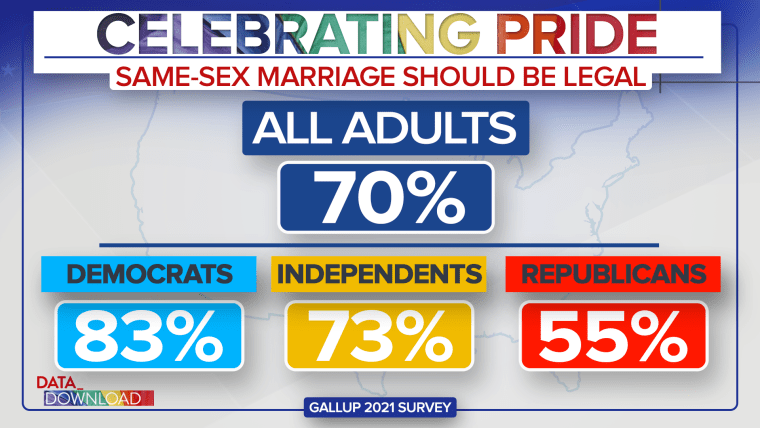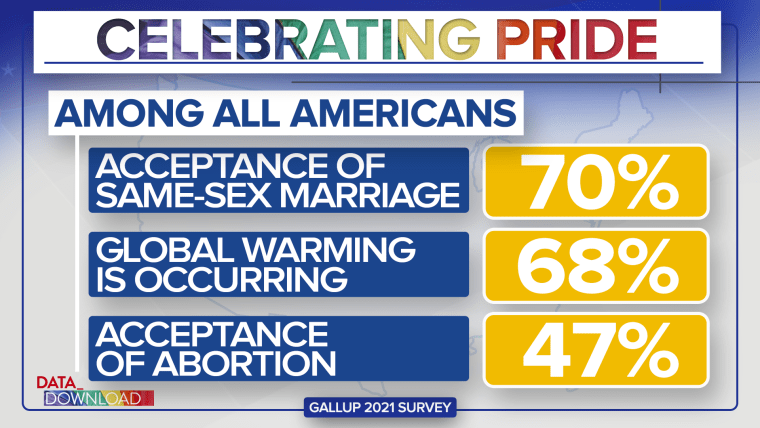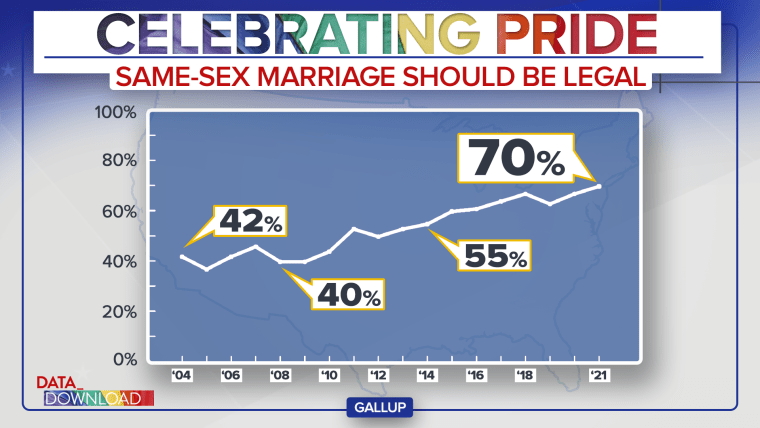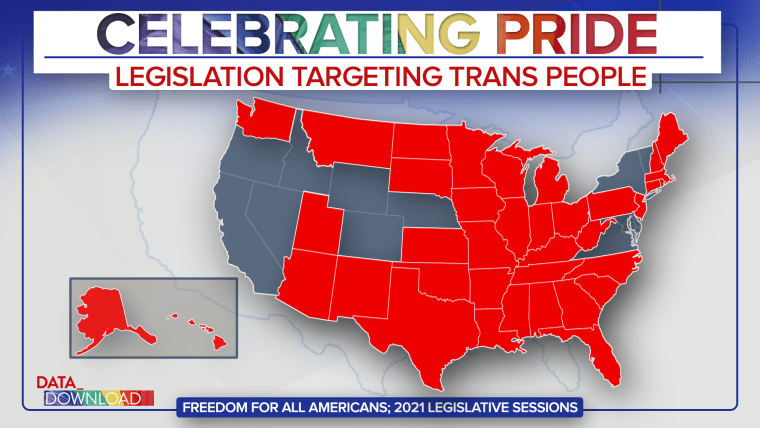WASHINGTON — In recent years, LGBTQ rights have made significant advancements in the United States, but there remain areas of growing legislative hurdles and challenges.
In a country that is divided on a long list of cultural and societal issues, the acceptance of gay marriage stands out as a remarkable exception. Once a divisive issue, it now has the support of 7 in 10 Americans, according to a recent poll from Gallup.
But perhaps even more impressive, gay marriage now has majority support across a long list of voter groups.

It’s probably not a big surprise that 83 percent of Democrats say they believe gay marriage should be recognized by law, but that's also true of 73 percent of independents and, more unexpectedly, 55 percent of Republicans.
And the Gallup data shows strong support from young and old as well. More than 80 percent of those from ages 18 to 34, but also 72 percent among middle-aged Americans and 60 percent support among those 55 and older.
That last number is especially eye-catching. Older Americans tend to be more culturally conservative than the public at large and 60-percent support is a solid number.
To give a sense of just how solid support for gay marriage is today, compare it to Gallup's numbers on some other somewhat divisive topics.

After decades of debate, the morality of abortion remains as divisive as ever — 47 percent of Americans believe it is morally acceptable.
Obamacare may be the law of the land, particularly after the Supreme Court's June ruling on the law, but still only 56 percent of Americans believe the federal government should make sure people have health care coverage.
And, it may be close, but more Americans believe gay marriage should be legal than believe that global warming is occurring. It's close (a statistical tie really) but gay marriage holds a slight edge in the percentages.
Those numbers give a sense of the depth of support for legal same-sex marriage and they are even more remarkable when you realize how fast opinions on the unions have changed. In 15 years, the issue has gone from culturally divisive to culturally decided.
How dramatic is that swing? Compare it to the relatively slow public acceptance of marriage between black and white Americans.

It took "interracial marriage" almost 40 years to gain acceptance in the United States — that's comparing support the first time Gallup asked the question (1958) to when it broke 50 percent support in the 1990s. When Gallup first asked about gay marriage in 1996, only 27 percent of Americans supported legalizing the bond. In just 15 years, 2011, 53 percent of Americans supported legalizing the practice.
Court decisions on the two practices only drive the point home.
Even if one uses the Supreme Court's 1967 Loving decision (the ruling that made laws against interracial marriage unconstitutional), as a marker for public opinion, it was still roughly 30 years before interracial marriage was accepted by the public. By the time the Supreme Court ruled that all states had to honor gay marriage as legal in 2015, 60 percent of Americans already favored that view.
In other words, the court was leading the nation on interracial marriage, but essentially following public opinion on gay marriage.
But not all issues are settled or headed in a positive direction for the LGBTQ community. Particularly on issues that concern transgender people, state legislatures are writing legislation to limit what that population can and can't do.

Research from the group Freedom for All Americans finds that 38 different states have proposed legislation in 2021 that would limit what trans Americans can do covering areas ranging from sports to homeless shelters to medicine. Texas and Tennessee led the way with 12 pieces of legislation each, according to the group.
And Gallup polling data from this year shows there has been a slight decline in acceptance for idea of transgender people serving in the military. Support for the idea is still high, 66 percent, but down five points from where it was in 2019. That number bears watching. It could just be a blip or something more.
The real lesson in Pride Month, however, may be as much about politics and the malleability of public opinion in America today as it is LGBTQ rights.
After all, Pride Month itself is still a relatively young event. It was just over 20 years ago, only in 1999, that then-President Bill Clinton declared June "Gay and Lesbian Pride Month" for the first time. Back then, only 35 percent of Americans thought gay marriage should be recognized by law, half the number in the 2021 poll.
It’s evidence that even in a time of deep partisanship on what seems to be a contentious issue, opinions can still change — and rapidly.